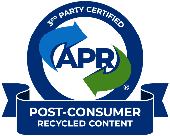PureCycle, Seminole County, League of Women Voters Partner to Recycle Campaign Signs from Primary Election
PureCycle partnered with Seminole County and the League of Women Voters to recycle campaign signs following the recent primary election.
 PureCycle, Seminole County, League of Women Voters Partner to Recycle Campaign Signs from Primary Election
PureCycle, Seminole County, League of Women Voters Partner to Recycle Campaign Signs from Primary Election PureCycle, Seminole County, League of Women Voters Partner to Recycle Campaign Signs from Primary Election
PureCycle, Seminole County, League of Women Voters Partner to Recycle Campaign Signs from Primary ElectionOrlando, Fla. – PureCycle Technologies, Inc. (Nasdaq: PCT), today, announced the Company’s partnership with the Seminole County government and the county’s chapter of the League of Women Voters led to the collection of nearly 800 pounds of campaign signs following the recent primary election. The signs will be recycled into PureFive™ resin that can be used in new products or packaging.
PureCycle CEO Dustin Olson said, “This has been a fantastic partnership with Seminole County and the League of Women Voters. Most importantly, this group has now created a blueprint of how we can do this around the country. I look forward to seeing even more signs collected and recycled during the upcoming general election in November and for years to come.”
Seminole County League of Women Voters President Cathy Swerdlow said, “It is great to see collaboration like this. These signs are an important part of the election process, but we needed a way to make sure they don’t end up in landfills or our beautiful lakes and rivers. Now, we have a program for collection and a solution to recycle these signs.”
Signs from November’s general election can be dropped off at the Seminole County Transfer Station at 1950 State Road 419 in Longwood.
Seminole County Solid Waste Division Manager Oliver Bond said, “Seminole County is proud to have successfully collected thousands of campaign signs during the 2022 election. We are excited to partner with PureCycle and the League of Women Voters again. This collaboration is a great example of how residents, community groups, and solid waste service providers can come together to reduce waste in our environment.”
In addition to Seminole County, PureCycle will be recycling campaign signs that are collected following the general election from Florida’s Brevard County and Lawrence-Scioto County in Ohio.
Most political signs are made from No. 5 plastic (polypropylene), a common plastic found in hundreds of household and commercial products. Most polypropylene goes unrecycled due to the difficulty and cost of the process. PureCycle uses a physical recycling process to separate contaminants, odors, and colors from polypropylene plastic waste - like election signs - and transform it into a purified, recycled resin.
###
PureCycle Contact
Christian Bruey
+1 (352) 745-6120
About PureCycle Technologies
PureCycle Technologies LLC., a subsidiary of PureCycle Technologies, Inc., holds a global license for the only patented solvent-driven purification recycling technology, developed by The Procter & Gamble Company (P&G), that is designed to transform polypropylene plastic waste (designated as No. 5 plastic) into a continuously renewable resource. The unique purification process removes color, odor, and other impurities from No. 5 plastic waste resulting in an ultra-pure recycled (UPR) plastic that can be recycled and reused multiple times, changing our relationship with plastic. www.purecycle.com
Forward-Looking Statements
This press release contains forward-looking statements, including statements about the financial condition, results of operations, earnings outlook and prospects of PCT. In addition, any statements that refer to projections, forecasts or other characterizations of future events or circumstances, including any underlying assumptions, are forward-looking statements. Forward-looking statements generally relate to future events or PureCycle’s future financial or operating performance and may refer to projections and forecasts. Forward-looking statements are often identified by future or conditional words such as “plan,” “believe,” “expect,” “anticipate,” “intend,” “outlook,” “estimate,” “forecast,” “project,” “continue,” “could,” “may,” “might,” “possible,” “potential,” “predict,” “should,” “would” and other similar words and expressions (or the negative versions of such words or expressions), but the absence of these words does not mean that a statement is not forward-looking.
The forward-looking statements are based on the current expectations of PureCycle’s management and are inherently subject to uncertainties and changes in circumstances and their potential effects and speak only as of the date of this press release. There can be no assurance that future developments will be those that have been anticipated. These forward-looking statements involve a number of risks, uncertainties or other assumptions that may cause actual results or performance to be materially different from those expressed or implied by these forward-looking statements. These risks and uncertainties include, but are not limited to, those factors described in the section entitled “Risk Factors” in each of PureCycle’s Annual Report on Form 10-K for the fiscal year ended December 31, 2023 and PureCycle’s Quarterly Reports on Form 10-Q, those discussed and identified in other public filings made with the Securities and Exchange Commission by PureCycle and the following: PCT's ability to obtain funding for its operations and future growth and to continue as a going concern; PCT's ability to meet, and to continue to meet, applicable regulatory requirements for the use of PCT’s ultra-pure recycled (“UPR”) resin in food grade applications (including in the United States, Europe, Asia and other future international locations); PCT's ability to comply on an ongoing basis with the numerous regulatory requirements applicable to the UPR resin and PCT’s facilities (including in the United States, Europe, Asia and other future international locations); expectations and changes regarding PCT’s strategies and future financial performance, including its future business plans, expansion plans or objectives, prospective performance and opportunities and competitors, revenues, products and services, pricing, operating expenses, market trends, liquidity, cash flows and uses of cash, capital expenditures, and PCT’s ability to invest in growth initiatives; the ability of PCT’s first commercial-scale recycling facility in Lawrence County, Ohio (the “Ironton Facility”) to be appropriately certified by Leidos, following certain performance and other tests, and commence full-scale commercial operations in a timely and cost-effective manner or at all; PCT’s ability to meet, and to continue to meet, the requirements imposed upon it and its subsidiaries by the funding for its operations, including the funding for the Ironton Facility; PCT’s ability to minimize or eliminate the many hazards and operational risks at its manufacturing facilities that can result in potential injury to individuals, disrupt its business (including interruptions or disruptions in operations at its facilities), and subject PCT to liability and increased costs; PCT’s ability to complete the necessary funding with respect to, and complete the construction of, (i) its first U.S. multi-line facility, located in Augusta, Georgia; (ii) its first commercial-scale European plant located in Antwerp, Belgium and (iii) its first commercial-scale Asian plant located in Ulsan, South Korea, in a timely and cost-effective manner; PCT’s ability to procure, sort and process polypropylene plastic waste at its planned plastic waste prep facilities; PCT’s ability to maintain exclusivity under the Procter & Gamble Company license; the implementation, market acceptance and success of PCT’s business model and growth strategy; the success or profitability of PCT’s offtake arrangements; the ability to source feedstock with a high polypropylene content at a reasonable cost; PCT’s future capital requirements and sources and uses of cash; developments and projections relating to PCT’s competitors and industry; the outcome of any legal or regulatory proceedings to which PCT is, or may become, a party including the securities class action and putative class action cases; geopolitical risk and changes in applicable laws or regulations; the possibility that PCT may be adversely affected by other economic, business, and/or competitive factors, including interest rates, availability of capital, economic cycles, and other macro-economic impacts; turnover in employees and increases in employee-related costs; changes in the prices and availability of labor (including labor shortages), transportation and materials, including inflation, supply chain conditions and its related impact on energy and raw materials, and PCT’s ability to obtain them in a timely and cost-effective manner; any business disruptions due to political or economic instability, pandemics, armed hostilities (including the ongoing conflict between Russia and Ukraine and the conflict in the Middle East); the potential impact of climate change on PCT, including physical and transition risks, higher regulatory and compliance costs, reputational risks, and availability of capital on attractive terms; and operational risk.





-1.png)
